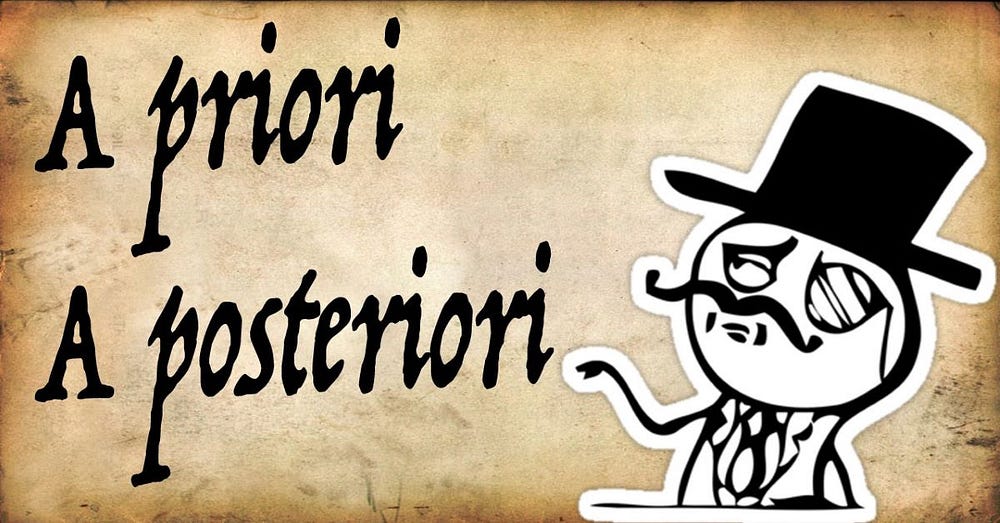The following is a short and simple account of Peter Murphy’s paper ‘Rewriting the A Priori/A Posteriori Distinction’, which has a self-explanatory title.

Dual Epistemic Justification

The philosopher Peter Murphy’s argument is that what he calls “nonbasic beliefs” (i.e., beliefs that depend on other beliefs) can be justified by both experiential and nonexperiential justifiers; not just by either one or the other.
Murphy is concerned with the cases
“in which neither the nonexperiential justifier nor the experiential justifier would suffice on its own, in the absence of the other, to justify the non-basic belief”.
So what would happen if one of the justifiers were absent? Murphy continues:
“In the absence of either justifier, one of the basic beliefs would be unjustified and, as a consequence, so too would the non-basic belief. The two justifiers function as cocontributors.”
Despite that, Murphy’s prime purpose is to “rewrite” Immanuel Kant’s strict binary distinction between a priori and a posteriori beliefs (see here). He argues that in the case of the justification of a nonbasic belief which has both a nonexperiential and an experiential justifier, Kant classified the resultant belief a posteriori.
Murphy gets his point across by offering us an example which is taken from the philosopher Saul Kripke (1940-).
A Kripke Case
Take the following argument:
(i) (H = P) ⊃ □(H = P).
(ii) (H = P)
(iii) ∴ □(H = P)
[H can symbolise a mental state (or water) and P can symbolise a brain state (or H₂O). The modal symbol □ stands for “it is necessary that”. ]
Murphy says that Kripke takes (i) above to be known a priori. That is, if H and P are identical, then they must be necessarily identical. Yet the identity of H and P in some cases (such as water and H₂O), however, was still only known (or discovered) a posteriori.
So what about (iii) — the conclusion?
Is that known a priori or a posteriori?
More relevantly, is the entire argument above a priori or a posteriori?
Murphy argues that Kripke follows Kant on this.
Kripke takes (iii) to be justified (or known) a posteriori because the identity of H and P (in (ii) above) was only known experimentally (or through observation). Thus the whole argument, as well as the conclusion, is classified a posteriori, despite it dealing with a necessary identity.
Yet Murphy has a problem with Kripke’s classification.
Murphy’s basic argument is that although the necessary identity of H and P only came to be known a posteriori, the modal conditional — i.e., (H = P) ⊃ □(H = P) — can still be known to hold without (extra?) experience. That is, it’s known to be necessarily true a priori without also needing to know about the content of the symbols H and P.
So, in the Kripke case and in the case of other nonbasic beliefs, we have what Murphy calls epistemic co-contributors.
Murphy gives another example of the phenomenon of epistemic co-contribution.
Firstly, we have the a priori part:
1) A child’s belief that 4 + 3 = 7 might be partly a priori justified by her intellectual insight.
And then the a posteriori part:
2) The same belief is partly a posteriori justified by her recent experience counting and recounting groups of blocks.
Murphy also offers us a similar example.
Again, firstly we have the a priori part:
1) A new logic student might have a marginally reliable a priori insight into DeMorgan’s Rule.
However:
2) He might also base his belief in DeMorgan’s Rule on his marginally reliable roommate’s testimony that DeMorgan’s Rule is true.
Murphy then highlights the case of inference.
A Priori Inference and Dual Justification
The American philosopher Laurence BonJour (1943-) makes much of inference in his apriorist criticisms of W.V.O Quine (1908–2000) and his “web of belief” thesis. BonJour’s basic argument is that although the beliefs in any Quinian “web” may well be empirical, that isn’t also true of the inferential links between them.
According to Murphy, BonJour also “proposes that acts of inferring are a distinct kind of justifier”.
What Murphy (or BonJour) is interested in is the move (or link) from belief to belief. Indeed even if there is a move from nonbasic experiential beliefs to other nonbasic experiential beliefs, that link still requires an epistemic description and/or explanation. More relevantly, the inference from belief to belief (or from beliefs to beliefs) needs to be justified. And this will result in dual justification.
Murphy argues that
“there will be cases where the inference is justified one way and the relevant premise-beliefs are justified another way”.
This means that the “premise-beliefs” may well be justified a posteriori. However, these premise-beliefs will have links to - or inferences from - other beliefs and those links will be a priori in nature.
Again, Murphy makes the conclusion that if we
“[t]ake away either the a posteriori justified belief or the a priori justified inference [] the person’s conclusion-belief would be unjustified”.
In Kant’s book, according to Murphy, we can say that
“[s]ince the conclusion-belief is dependent on an experiential justifier for its justification, Kant has us put it in the a posteriori category”.
Thus Kant argued that the “conclusion-belief” is a posteriori in nature, despite the fact that it was derived from a process which is a priori (even in the case when the premise-beliefs were also a posteriori).
Murphy also detects an "asymmetry" in Kant’s account. Thus:
1) To be a posteriori justified, a belief only needs to partially depend on experiential justifiers.
However, an a priori justified belief doesn't get the same treatment from Kant. Thus:
2) “To be a priori justified, it is not enough that a belief partially depend on nonexperiential justifiers for its justification – it must exclusively depend on nonexperiential justifiers.”
Where does Murphy stand on the general empiricism/rationalism debate which underpins the issues just discussed?
Murphy’s Weak Rationalism
Murphy detects four positions.
Firstly, he detects two radical positions:
(1) Radical empiricism: this position denies that there are any non-experiential justifiers and insists that all justified beliefs are justified a posteriori.
And:
(2) Radical rationalism: this position denies that there are experiential justifiers and insists that all of our beliefs are justified a priori.
Now take the two moderate positions:
(3) Strong rationalism: this position argues that some of our justified beliefs are a priori justified.
And:
(4) Weak rationalism: this position argues that there are non-experiential justifiers, but restricts their justifying power to beliefs that are justified in a mixed manner.
To sum up. Clearly Peter Murphy opts for position 4) above.









No comments:
Post a Comment